Editor’s note: Among the many challenges that warehouses and distribution centers face during the COVID-19 pandemic is the need to protect employees while responding to increased demand. 6 River Systems Inc. shared this blog post on how its Chuck mobile robots and software can help its supply chain customers and their employees.
At 6 River Systems, we maintain a laser focus on our customers’ needs and improving our solutions for them. In today’s environment, the top thing on most operators’ minds is keeping their associates safe while running their operations. In response, we devoted a team to focus solely on recommendations, updates, and features to improve the safety of associates with respect to pathogens such as COVID-19.
Operations that are using Chucks for automation already have an advantage in the fight against COVID-19 compared to traditional cart pick operations. They are more efficient and require fewer associates in the building than manual operations to get the same throughput. While this is a great start, our goal is to find new ways to increase safety at our customers’ operations.
Each operation is unique; not every solution works for every site. Likewise, designing solutions during the COVID-19 pandemic is a balance between safety, efficiency, current site design and demand. Rather than offering a one-size-fits-all solution, we have compiled a list of recommendations to review and implement in partnership with each customer site. Here is some of what we’ve shared with our customers.
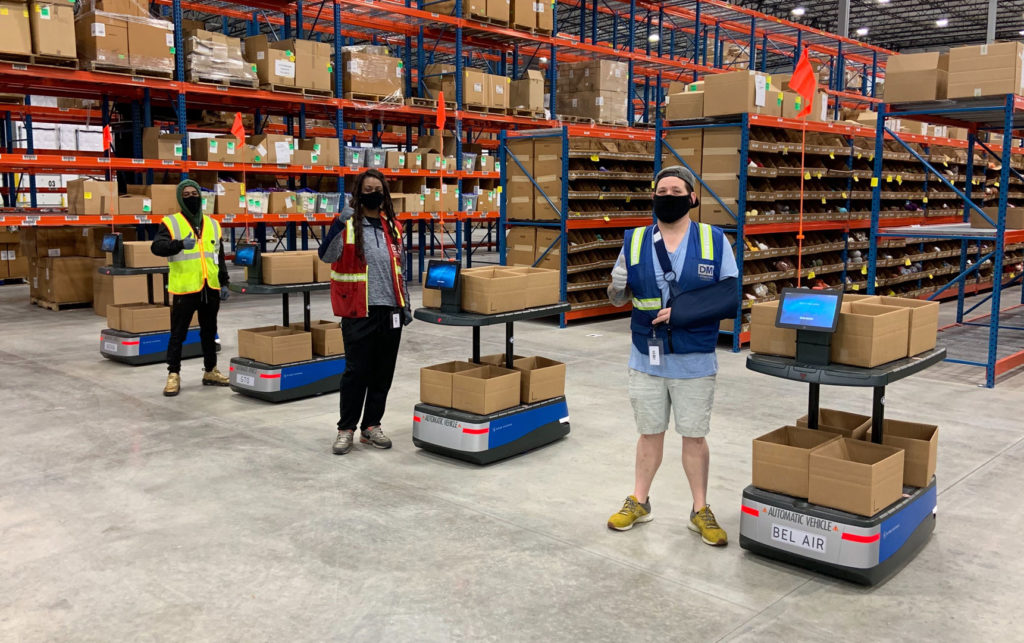
What 6 River Systems recommends immediately
Hardware recommendations
Health and hygiene recommendations differ from operation to operation, though we are recommending that all associates wear protective gloves and a mask. Chuck is designed with large, easy-to-clean and robust action and pause buttons and lights, reducing interactions with touchscreens. Chuck’s touchscreens are compatible with styluses and with a wide variety of gloves, which helps prevent cross-associate contamination.
Similarly, we have provided our customers recommendations for proper sanitation of screens and surfaces on Chuck. When an associate meets a new robotic cart and before they begin the picking, induct, or takeoff process, we have advised them to take a few seconds to wipe down the few areas that are touched — action buttons, pause button and touchscreen — with a sanitizing wipe, which is stored on the Chuck.
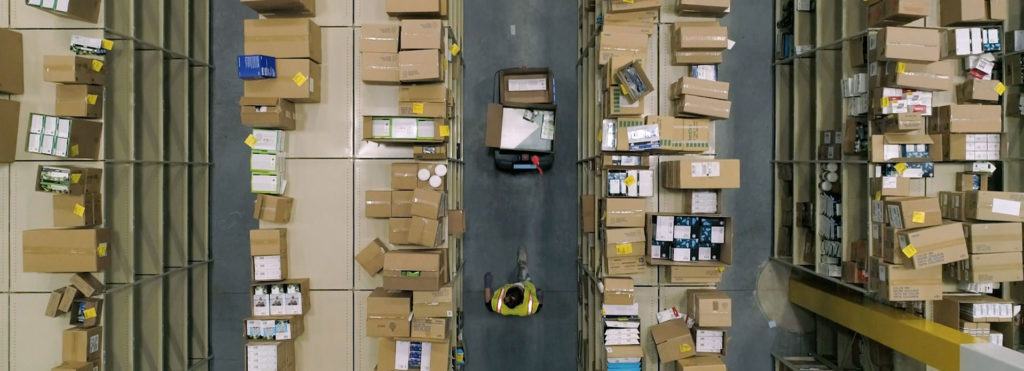
Operational recommendations
When mitigating risk of exposure to pathogens, there are two schools of thought that we are recommending to our customers: Sites should seek to minimize tactile exposure throughout the warehouse, and they should maximize social distance between associates. Regardless of the approach decided upon by the customer, 6RS is a directed system, with associates simply following instructions from Chuck.
Without making any changes to a site’s operational design, Chuck enables a base-level of social distancing within a warehouse by automating long walks between induct, active picking, and takeoff areas, all of which are often crowded areas on the warehouse floor. With the exception of breaks, the associate can remain on the picking floor at a safe distance from other associates.
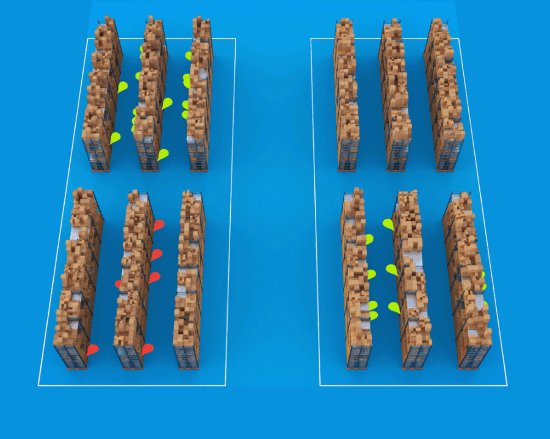
To minimize shared surfaces and tactile exposure, we can implement changes to limit the number of Chucks an associate works with during the day.
Alternately, operators can limit cross-contamination on the pick faces by utilizing static zoning rules to ensure associates remain in place while Chuck crosses from one zone to the next. Combined with a regular sanitization of buttons, screens and other items on Chucks, this should significantly reduce contamination risk.
Our solutions and data insights teams are ready to review the impact of layout changes, such as temporarily restricting two-way aisles to one-way traffic. This practice, long in place at many of our sites to maximize inventory storage and recently adopted by local supermarkets, reduces in-aisle interactions between associates and supports social distancing.
We also recommend that sites picking to totes wipe them down at induct or temporarily switch to picking into shipping containers, if possible. This reduces the risk of commonly touched surfaces.
What 6 River Systems will provide for protection
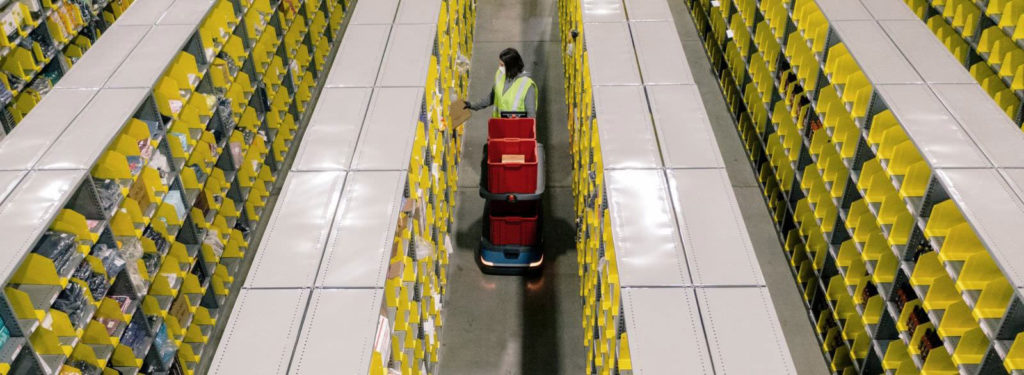
We are working to quickly prototype and deploy an accessory to hold sanitizing wipes and gloves that we will provide to customers at no cost.
In addition, we are working to enhance compliance with new hygiene practices by updating our software to remind associates to wipe down Chuck’s confirmation buttons and screen immediately after they badge in (a touchless process).
Furthermore, we are working to make the entire picking experience touchless by using an associate barcode “cheat sheet” to replace most of the common touches on Chuck.
Our engineers are making software changes to ensure that when Chucks are engaged with associates, they follow social distancing protocols when coworkers do meet in picking aisles.
At MODEX this year, we announced a tote auto loader/unloader for our mobile robots. This type of automation increases safety by reducing touches of common surfaces and will also increase our customers’ throughput during this surge in direct to consumer ordering.
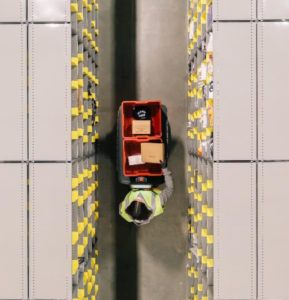
Our promise
So much of today’s dynamic environment is uncertain. We recognize that each of our customers’ sites are experiencing different challenges, be it in volume, labor, safety or uncertainty. We are dedicated to providing the right solutions for our customers.
Internally, we have always championed flexibility in our solutions which allows us to rapidly make changes in times of need. We are driven by a handful of core values, one of which is we all win when our customers win. We will continue to look at new approaches and technologies to keep our customers’ associates safe. We at 6 River Systems wish you, all your employees and loved ones good health in these difficult times.
 About the author
About the author
Chris Cacioppo is co-founder and chief technology officer of 6 River Systems. He is responsible for technical oversight and advanced programs at the Waltham, Mass.-based company. Cacioppo is a veteran of many startups and previously ran engineering at Mimio, an education technology company. He has a Master’s from MIT in electrical engineering and computer science.




